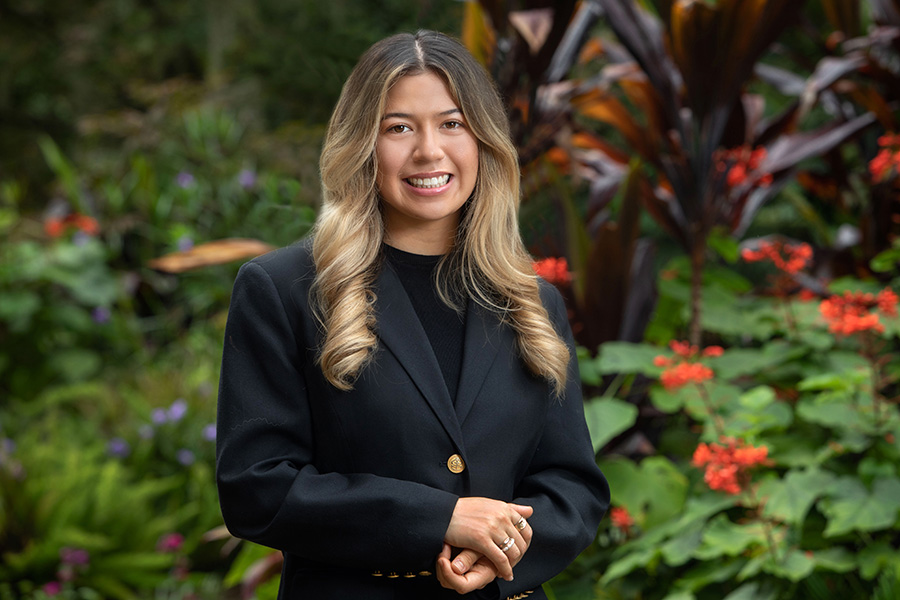
““FSU has allowed me to grow as a scientist and has shown me parts of my identity I never knew existed.” ”
Fast Facts
- Student organization: Chair of Alpha Chi Sigma
- FSU favorite memory: Attending every home basketball game during a single season
- FSU special spot: The psychology building courtyard
- Favorite study spot: The Dirac Library
- FSU family ties: One of four siblings to attend the university
- Accomplishment: Received the 2022 American Chemical Society Undergraduate Award in Inorganic Chemistry
Florida State University junior Natalie Jen saw the opportunity to pursue scientific research as an important factor in deciding where to attend college. In FSU, she found a university with extensive undergraduate research and funding opportunities — and in doing so became the fourth Seminole sibling in her family.
During her freshman year, Jen explored new scientific fields such as computer science and chemistry that interested her outside of her biological science major. It wasn’t until she met Chemistry Professor Michael Shatruk that her scientific inquiry gravitated exclusively toward inorganic chemistry.
Three years since discovering her passion, Jen has made breakthroughs concerning two-dimensional molecular materials and their ability to meet scientific and societal challenges.
“The importance of two-dimensional materials stems from their ability to be fine-tuned, which classifies them as ‘designer materials,’” she said. “I am working to discover the materials’ different magnetic properties in hopes of integrating them into molecular devices and improving upon those available in the current market.”
In recognition of her research in inorganic substances, Jen received the 2022 American Chemical Society Undergraduate Award in Inorganic Chemistry, a national award established to foster further study in the field.
Although she already has contributed significantly to FSU’s scientific community, Jen serves as department chair of Alpha Chi Sigma to encourage other students to pursue their passions and ambitions as chemists. She plans to later pursue a doctorate degree in inorganic chemistry.
What inspired your passion for biological science?
I was initially inspired to study biological science because of an environmental science class I took my first year. However, there are many scientific fields I would like to explore in my lifetime. Even though I want to pursue a doctorate in chemistry, I would like to revisit my biology degree so that I can use my expertise in chemistry to help with biological problems, such as conservation initiatives.
How has your experience at FSU fostered your passion for molecular chemistry?
My experience at FSU has provided me with an opportunity to discover my interests in both chemistry and computer science. When I arrived at FSU, I wasn’t entirely sure where I belonged but knew I wanted to explore a wide variety of research opportunities. By taking computer science courses, I have found which fields of research intrigue me most. Molecular chemistry allows me to work in a constantly evolving field that combines my interests in technology. In addition to giving me a creative outlet, this experience taught me so much about the value of molecular devices in everyday life.
My passion for molecular chemistry ultimately arrived when I met Professor Michael Shatruk and his research group. With their guidance and support, I have learned synthesis procedures and how to operate a single crystal X-ray diffractometer and a superconducting quantum interference device.
What impact do you hope your research on two-dimensional molecular materials has on FSU’s scientific community?
My research focuses on two-dimensional molecular materials that have the potential to be used in common molecular devices, such as USBs that plug into computers or quantum devices. I hope my research will advance our ability to use two-dimensional molecular materials in devices and create more opportunities for collaboration with other campus organizations on two-dimensional heterostructures and “hybrid “devices.
How has FSU helped progress your research on inorganic solid materials?
With the help of an IDEA grant from FSU, I was able to create my own project on the two-dimensional material known as ultrathin structures. These materials differ from traditional inorganic solids in that they can be fine-tuned. The simplest way to understand ultrathin structures is to envision having three connected Lego pieces and taking one out and adding a new one. Instead of Legos, however, I used a metal, halide and carbon chain to serve as a cap. I then replaced them one at a time to see how this altered their magnetic properties.
The IDEA grant has allowed me to gain experience with mentors like Professor Shatruk, who has guided and allowed me to be a part of a field I would have never seen myself in three years ago. FSU has ultimately helped me grow as a scientist and provided skills I plan to take into the next chapter of my life.
In what ways has your research involvement at FSU influenced the kind of work you hope to continue in your intended field?
Being an inorganic chemist is exciting because, unlike organic chemists, inorganic chemists have the freedom to experiment with any elements on the periodic table — nothing is off limits. While at FSU, I have worked on molecular devices and spin-crossover materials, both of which are considered magnetic materials.
Taking part in different research projects that cover topics ranging from ligand synthesis to spin state switching materials has given me the confidence to explore different parts of my identity I never knew existed.




